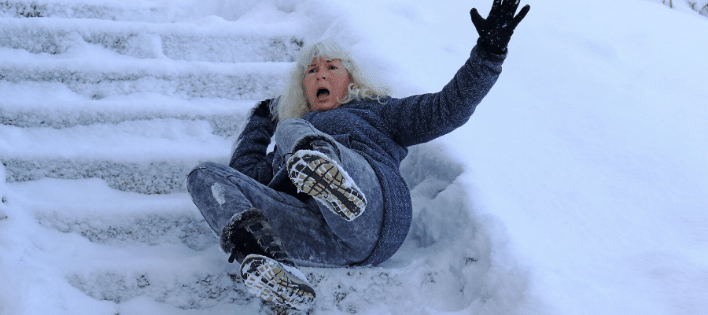Every year, millions of people wonder what to do after a fall, especially if the accident causes them pain, suffering, lost work time, medical expenses and other inconveniences that typically follow an unexpected injury.
Falls are the most common injury-causing accident in Canada. Every year, more than 650,000 people seek treatment in hospital emergency rooms for injuries related to falling.
In addition to contacting a lawyer with experience in these types of injuries, it’s important to know what to do after a fall in order to preserve your health.
What to Do After a Fall?
If you have slipped while walking on the property of a neighbor, retail store, school, municipality or hospital, you should try to remain calm, assess your situation and begin these steps.
Whenever you fall, consider the following information so you’ll be able to get up without hurting yourself or contact help as soon as possible:
If You Can Get Up After Falling
Even if you think, “I’m fine. That was no big deal,” you should still catch your breath, check for obvious injuries and wait a minute or so before getting up. This is a good rule for anyone who has fallen despite age and health. Falls can be deceptively dangerous because some injury symptoms don’t show up for quite a while.
For many people, it helps to follow a short procedure after falling:
- Don’t attempt to rise while on your back.
- Rather, turn to your side or face slightly downward first.
- Then, use your arms to scoot toward a chair or solid, sturdy object.
- Pull yourself up and sit down on a chair as soon as possible.
- Remain calm
If You Can’t Get Up
If you feel any amount of pain or suspect that you have suffered an injury in the fall, do not attempt to get up. Call for help any way you can, using your voice, a telephone or specialized medical “alert” device. If you have a cane, tap it on something nearby, like a garbage can or light pole, to make noise. Make yourself as comfortable as possible while you wait for assistance, calling out “Help!” periodically to get someone’s attention. You still need to remain as calm as possible.
Symptoms to Watch Out For
Not all falls are the fault of slippery walkways, snow or ice. Indeed, there are many medications and illnesses that cause people to become dizzy and lose their balance. If you have fallen, discuss the incident with your doctor as soon as possible to rule out medical various causes.
Some of the common symptoms of fall-related injuries include the following:
- Unsteadiness or generalized weakness
- Loss of consciousness
- Drowsiness
- Dizziness
- Headaches
- Nausea
- Severe and/or lingering pain
- Vision-related problems
Should I Seek Legal Assistance?
If you have slipped while walking on the property of a neighbor, retail store, school, municipality or hospital, you should note that there are sometimes strict time limits pertaining to when you can file a legal case and sue to claim damages for fall-related injuries and suffering.
In some instances, for example, you’ll need to notify the other party within 10 days of the accident, but will usually have at least two years to file a claim. Every situation is different and depends on where the incident occurred, who was responsible along with a few other factors.
If you have suffered a fall, it’s essential to consult with a lawyer in order to determine if you have a valid case and how to proceed.
Knowing what to do after a fall is essential for many reasons. If you intend to recover damages or receive reimbursement for medical expenses, you’ll need to have a firm legal foundation in order to prove your case.
A lawyer who has experience with clients who have fallen is your best resource. General legal experience is often not enough due to the specific legal issues involved and the many demands related to proving a case at trial.
Note also that the physical effects of a fall sometimes don’t manifest for weeks or months, especially in situations where the victim has suffered a head injury or injury to the back or spine.















